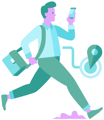Get care now



CARE
Six tips for making your meds work for you
Posted January 26, 2017
Medications are prescribed with good intentions but can often cause more harm than good, especially for older adults who see multiple providers. As a pharmacist, I try to address that risk by developing tools and habits to help people take medications safely. Here are a few helpful tips.
1. Make a list of all of your
medications and pharmacies.
It's very common for older adults to leave an appointment without a full understanding of what a new prescription is for. Be prepared to give your provider an up-to-date list of all medications and pharmacies to avoid
potential harmful errors, especially if you see multiple providers or use more than one pharmacy. While I typically advise patients to use one pharmacy, that isn't always possible.
2. Know the basics.
When it comes to your medications, it's important for you and your caregivers to have a basic understanding of what each is for. Think generally: "This green pill is for my blood pressure, this round pill is for my cholesterol, this pink pill is for my asthma."
3. Keep
medications together, preferably in
the kitchen.
I tend to recommend keeping all medications together in the kitchen. It's often the first place people go in the morning, when most medications are taken. The other benefit is that the kitchen is typically kept at room temperature. Medications stored in the bathroom are at greater risk of being damaged due to heat and
humidity.
4. Be picky with vitamins and
supplements.
Supplements aren't regulated the same way as prescription drugs are. First, they aren't required to prove effectiveness like prescription drugs. Second, the quality of the supplement can vary dramatically from product to product. Supplements can
have great value — and can even help relieve side effects from certain medications — but buyer beware. Always be sure you're buying from a reputable company so you know exactly what you're taking.
5. Know
the risks.
All medications come with risk for side effects. For patients who are prescribed medications like opioids, for example, I make sure they are aware of the risks of overuse and abuse. Make sure to ask your provider about the risks of your medications to keep yourself and others in your home safe.
6. Know what works for you.
Taking medication is no different than any other habit that you develop. Review your daily routine and fit your medications in a place that makes sense. Use a pill timer or an alarm to keep on track or work with a family member or your pharmacist to
develop another strategy.
Bonus
tip: Be an attentive caregiver.
If you are a caregiver, watch for these warning signs that your loved one may not be taking medications appropriately:
- medications are kept in multiple places
- pillboxes are full of medicine
- pills are found on the floor (due to shaky hands)
- medication bottles are outdated
- the number of pills inside a bottle don't add up to what's been prescribed
If your loved one doesn't have regular routines, like when he or she eats meals, runs errands or goes to bed, it can be harder to remember to take medication. Do what you can to understand your loved one's situation and help them develop a regular routine.
-
Allina Health Pharmacy
See locations -
Understand your prescriptions
Learn more
MORE ARTICLES LIKE THIS
Get fun, inspiring, provider-reviewed articles sent to your inbox.
Sign up for our email newsletter





